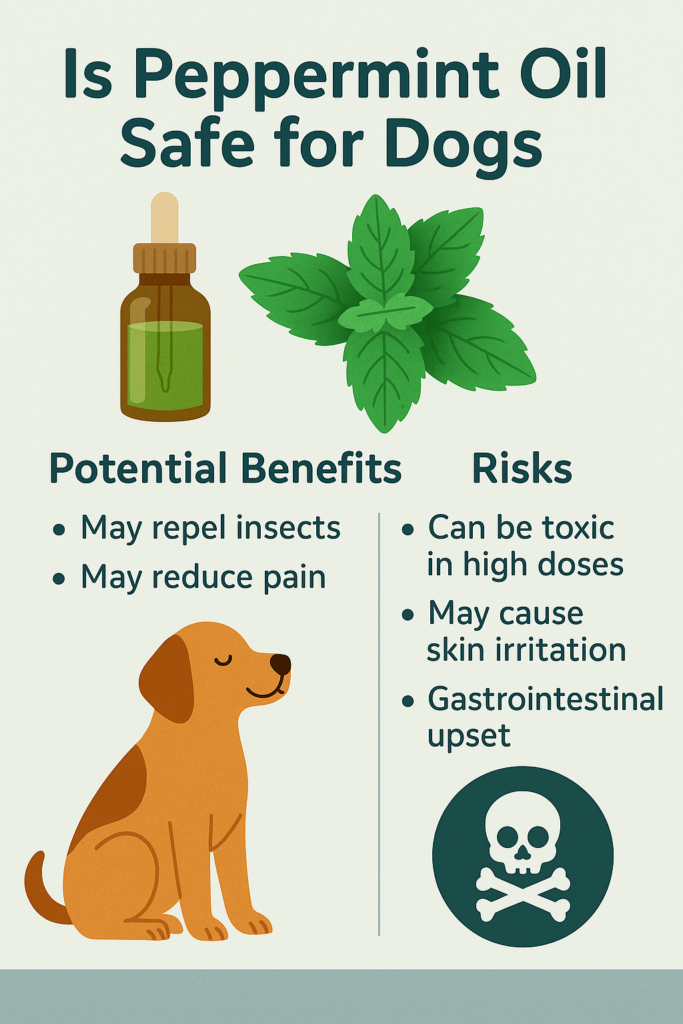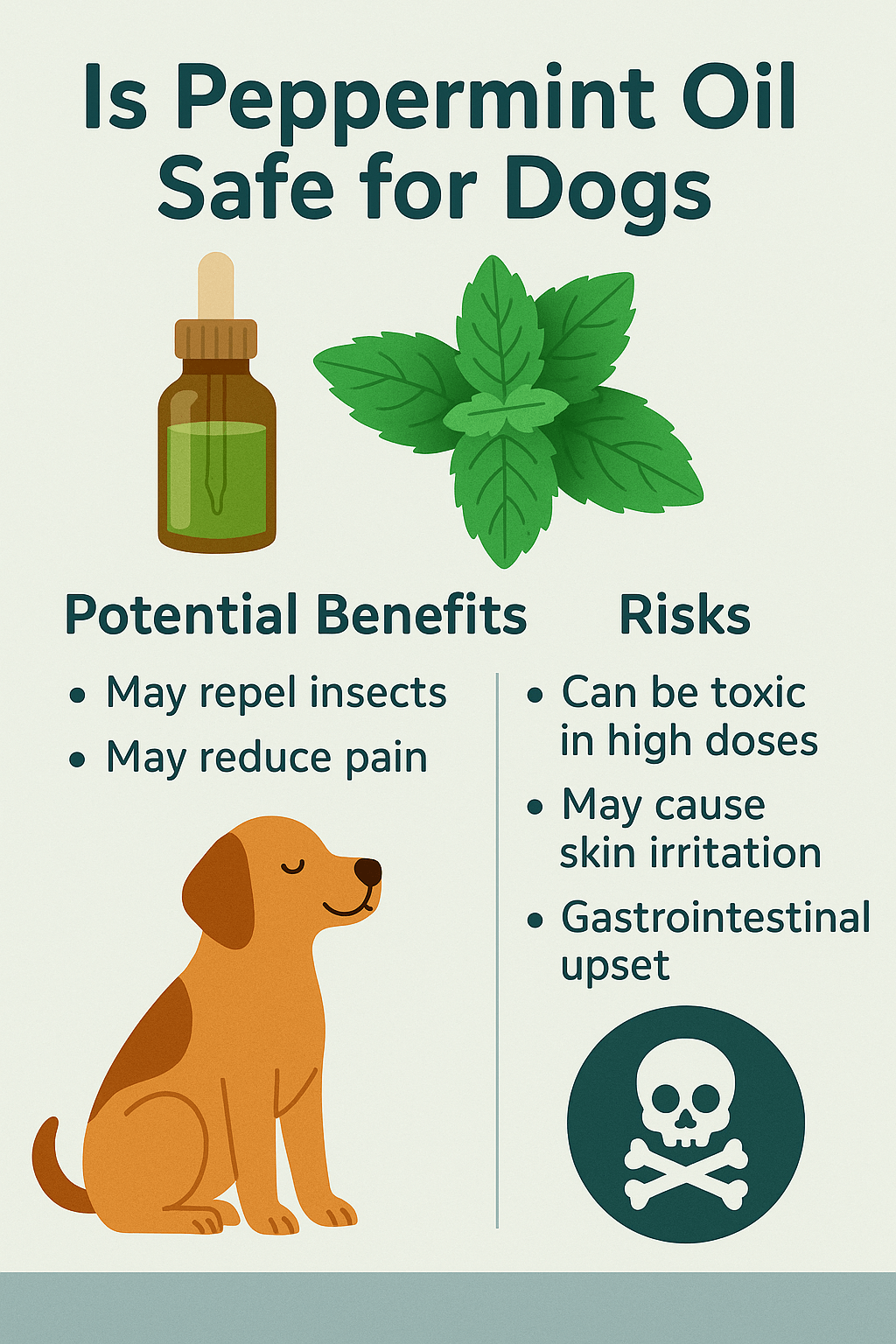Is Peppermint Oil Safe for Dogs?
Peppermint oil is a popular essential oil known for its refreshing scent and various health benefits for humans. However, when it comes to our furry friends, the rules change. Many pet owners wonder whether peppermint oil is safe for dogs or if it poses potential risks. While some essential oils can be beneficial in small, controlled amounts, others may cause harm if misused. Understanding how peppermint oil interacts with your dog’s physiology is crucial before introducing it into their environment. In this blog post, we’ll explore the safety concerns, potential uses, and precautions associated with peppermint oil to help you make informed decisions about your dog’s well-being.
Expert Insight on Peppermint Essential Oil for Dogs
“Peppermint essential oil is not recommended for dogs for various reasons, but in short, there is clinical evidence of many negative effects, including toxicity, and very little scientific evidence of any benefits.”
Potential Risks of Using Peppermint Oil Around Dogs
While peppermint oil has its benefits, it can also pose significant risks to dogs if not used carefully. Here are some potential dangers to keep in mind.
Toxicity When Ingested:
If a dog ingests peppermint oil, it can lead to symptoms like vomiting, diarrhea, and stomach upset due to its concentrated nature.Respiratory Irritation:
Strong scents from essential oils, including peppermint, can irritate a dog’s sensitive respiratory system, especially in enclosed spaces.Skin Sensitivity:
Direct application of undiluted peppermint oil can cause skin irritation, redness, or allergic reactions in some dogs.Liver Damage:
Essential oils are metabolized by the liver, and prolonged exposure may strain a dog’s liver, particularly in smaller breeds or those with pre-existing conditions.Behavioral Changes:
Some dogs may exhibit signs of stress, confusion, or lethargy when exposed to strong scents like peppermint oil.
These risks highlight the importance of using peppermint oil cautiously and only under professional guidance to avoid harming your pet.

Safe Uses of Peppermint Oil for Dogs (When Properly Diluted)
When used correctly, peppermint oil can offer certain benefits for dogs. However, strict adherence to safety guidelines is essential.
Repelling Pests Naturally:
Diluted peppermint oil can act as a natural flea or tick repellent when applied sparingly to a dog’s collar or bedding.Calming Anxiety:
In highly diluted forms, peppermint oil may have a calming effect on anxious dogs, though lavender oil is often preferred for this purpose.Soothing Muscle Pain:
When mixed with a carrier oil, peppermint oil can be gently massaged onto sore muscles to provide relief for active or senior dogs.Freshening Odors:
A few drops of diluted peppermint oil can be used to freshen a dog’s bedding or living area without overwhelming their senses.Training Aid:
The scent of peppermint oil can be used as a positive reinforcement tool during training sessions, provided it’s introduced gradually.
While these uses are possible, always consult a veterinarian before incorporating peppermint oil into your dog’s routine.
Check this guide 👉Can Dogs Have Peppermint? Best 7 Expert Tips!
Check this guide 👉My Dog Ate a Peppermint Candy: Best 7 Health Tips!
Benefits of Peppermint Oil for Dogs | Precautions When Using Peppermint Oil |
|---|---|
Natural pest repellent | Always dilute with a carrier oil |
Calms anxiety in small doses | Avoid direct skin contact |
Soothes minor muscle discomfort | Use in well-ventilated areas |
Freshens odors safely | Monitor for adverse reactions |
Supports training efforts | Consult a vet before use |
Signs Your Dog May Be Reacting Negatively to Peppermint Oil
If your dog has been exposed to peppermint oil, it’s important to recognize signs of distress or toxicity. Early detection can prevent serious complications.
Excessive Drooling:
Drooling is a common sign that a dog has ingested something unpleasant or toxic, such as undiluted peppermint oil.Difficulty Breathing:
Respiratory distress may occur if a dog inhales concentrated peppermint oil fumes in an unventilated space.Lethargy or Weakness:
Unusual tiredness or lack of energy could indicate poisoning or liver strain caused by the oil.Vomiting or Diarrhea:
Gastrointestinal upset is a telltale sign of ingestion and should be addressed immediately.Pawing at the Face:
This behavior suggests irritation from inhaling or coming into contact with the oil.
If you notice any of these symptoms, seek veterinary care promptly to ensure your dog’s safety.
How to Safely Introduce Peppermint Oil to Your Dog
If you decide to use peppermint oil around your dog, it’s crucial to do so safely and responsibly. Follow these steps to minimize risks.
Consult Your Veterinarian First:
Always get professional advice before introducing any new substance into your dog’s environment.Use High-Quality Oils:
Choose pure, therapeutic-grade peppermint oil to avoid contaminants or harmful additives.Dilute Thoroughly:
Mix one drop of peppermint oil with several tablespoons of a carrier oil like coconut or olive oil to reduce its potency.Test on a Small Area:
Apply a tiny amount of diluted oil to your dog’s fur and monitor for any adverse reactions before wider use.Avoid Sensitive Areas:
Keep peppermint oil away from your dog’s eyes, nose, mouth, and genitals to prevent irritation.
By following these precautions, you can help ensure that peppermint oil remains a safe addition to your dog’s care routine.
Common Mistakes to Avoid When Using Peppermint Oil Around Dogs
Even well-intentioned pet owners can make mistakes when using essential oils like peppermint. Here’s what to avoid to keep your dog safe.
Using Undiluted Oil:
Applying undiluted peppermint oil directly to your dog’s skin or fur can cause severe irritation or burns.Diffusing Too Strongly:
Overloading a diffuser with peppermint oil can overwhelm your dog’s sensitive respiratory system.Ignoring Breed-Specific Sensitivities:
Smaller breeds or brachycephalic dogs (e.g., pugs, bulldogs) are more susceptible to respiratory issues from strong scents.Leaving Bottles Accessible:
Curious dogs may knock over or ingest bottles of peppermint oil, leading to accidental poisoning.Assuming All Dogs React the Same Way:
Each dog is unique, and what works for one may harm another—always proceed with caution.
Avoiding these mistakes ensures a safer experience for your dog.
Alternative Solutions for Common Dog Care Needs
If you’re hesitant about using peppermint oil, there are plenty of alternatives that address similar needs without the risks.
Natural Flea Repellents:
Herbal shampoos, diatomaceous earth, or vet-approved flea collars can effectively manage pests without essential oils.Anxiety Relief Options:
Products like pheromone diffusers, calming treats, or CBD oil are safer choices for reducing stress in dogs.Muscle Pain Remedies:
Warm compresses, gentle massage, or prescription medications from your vet can soothe sore muscles.Odor Control Methods:
Baking soda, enzymatic cleaners, or dog-safe air fresheners eliminate odors without harsh chemicals.Training Tools:
Clickers, treats, and verbal praise are effective ways to reinforce positive behaviors during training sessions.
These alternatives provide peace of mind while catering to your dog’s needs.
Understanding Your Dog’s Sensitivity to Scents
Dogs have an extraordinary sense of smell, which makes them more reactive to strong scents like peppermint oil. Here’s why their sensitivity matters.
Superior Olfactory Abilities:
A dog’s nose has up to 300 million olfactory receptors, compared to a human’s mere 5-6 million, making them highly sensitive to potent aromas.Emotional Responses to Scents:
Certain smells can evoke fear, curiosity, or relaxation in dogs, influencing their mood and behavior.Health Implications of Strong Scents:
Overexposure to intense fragrances can lead to headaches, nausea, or respiratory issues in dogs.Individual Preferences:
Just like humans, dogs have preferences and aversions to specific scents, which vary from one individual to another.Training Through Scent Association:
Positive associations with mild scents can enhance training outcomes without overwhelming their senses.
Understanding your dog’s relationship with scents helps you create a harmonious and comfortable environment for them.
Frequently Asked Questions About Peppermint Oil and Dogs
Can I diffuse peppermint oil around my dog?
Yes, but only in well-ventilated areas and for short periods. Avoid high concentrations that could overwhelm their senses.
What should I do if my dog ingests peppermint oil?
Contact your veterinarian or an animal poison control hotline immediately for advice.
Are all essential oils unsafe for dogs?
No, some essential oils are safe when properly diluted, but many (like tea tree oil) are toxic even in small amounts.
Can puppies tolerate peppermint oil?
Puppies are more vulnerable to toxins, so it’s best to avoid using peppermint oil altogether until they’re fully grown.
How much peppermint oil is considered safe?
There’s no universally safe amount; always consult a vet for personalized guidance based on your dog’s size and health.
Prioritizing Your Dog’s Safety When Using Peppermint Oil
While peppermint oil can offer certain benefits for dogs, its use requires careful consideration and strict adherence to safety protocols. From pest repellents to soothing muscle pain, peppermint oil has its place—but only when properly diluted and supervised. Always prioritize your dog’s health and well-being by consulting a veterinarian before introducing any new product into their routine. By staying informed and cautious, you can enjoy the refreshing qualities of peppermint oil while ensuring your beloved companion remains happy, healthy, and safe.
Do Cats Have Taste Buds? Best 7 Expert Tips! – Discover how cats experience flavors and why their taste is so unique.
Do Dogs Have Taste Buds? Best 7 Expert Tips! – Discover how dogs experience taste, their preferences, and what it means for their diet and health.
Can Cats Taste Sweet? Best 7 Expert Tips! – Discover why cats can’t taste sweetness, how it affects their diet, and tips to keep them healthy and happy.
Can Dogs Taste Sweet? Best 7 Expert Tips! – Discover how dogs perceive sweetness, which foods are safe, and tips to manage their sweet cravings responsibly.





